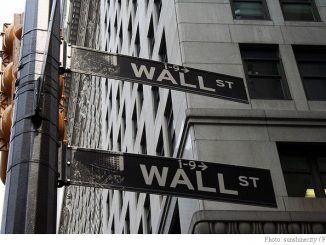The J.P. Morgan (JPM) situation continues to metastasize. As I suggested in my first post, its biggest effect is regulatory/political. Yes, $2 billion is a lot of money, but it in no way threatens JPM in the slightest. But the political and regulatory aftershocks are massive. This has changed the entire financial industry regulatory/political dynamic.
The contention focuses on the Volcker Rule, and in particular the “portfolio hedging” exemption. Look. Financial institutions are portfolios of assets and liabilities. From a systemic risk perspective, you care about the probability that the value of a big bank’s portfolio of assets will fall below the value of its liabilities-or that funders fear that it might, and hence refuse to rollover the firm’s debt, leading to a liquidity crisis. What you should care about is the risk of the portfolio.
Derivatives trades are typically the most efficient and rapid way to adjust that portfolio risk up or down. To evaluate a particular derivatives trade, you have to evaluate its effect on the risk of the entire portfolio. It makes no sense to evaluate a derivatives trade as a “hedge” solely by pairing it up against another individual transaction. This is particularly the case when you are talking about macro risks, like broad conditions that affect creditworthiness of entire continents. Why wouldn’t you hedge macro risks with macro hedges?
So the questions become: How do you evaluate the effect of a trade on the risk of a portfolio? Does the return justify any additional risk (for risk minimization is decidedly not the appropriate objective function)? Can regulators evaluate the risk better than financial institutions themselves?
And there’s the rub. Morgan’s story is thats new risk measurement model deemed the trade as risk reducing. But the trade didn’t perform as the model said it should. So Morgan went back to the old model, which showed it to be far riskier than the new model. Under this interpretation, risk was assumed unintentionally, due to incorrect modeling. That’s quite a different thing from a speculative punt.
There are many ways that could have occurred, some of which reflect discreditably on Morgan, others not. My guess is that the new model was seriously wrong about correlations. These are devilish hard to get right generally, and in credit particularly. Moreover, any VaR-type model almost always fails to capture properly the effect of position size on risk. These models take price processes as exogenous, but if you are big enough that’s not true. The big trader’s actions can themselves cause the model to give wildly misleading results. Any risk model has flaws, but these flaws are less severe for price takers than price makers.
And as for alternatives to VaR, such as conditional expected loss measures, please. They are just different ways of representing the same underlying information, and rely on the same assumptions. I guarantee that if Morgan’s VaR-esque new model underestimated risk, any other metric, such as conditional expected loss, would have done so too if it was based on the same underlying distributional assumptions and parameter estimates. Indeed, some of these estimates are more sensitive to distributional assumptions than VaR, because they depend on modeling of behavior of the tails. They tend to go further beyond the available data than VaR models.
And could a regulator do any better? Yeah. Right. Get serious.
Can simple rules, such as “any trading position must be shown to reduce a specific transactional risk” uniformly lead to better results? Not, in my opinion, when you are talking about complex financial institutions with diverse portfolios. Indeed, although trades characterized as “portfolio hedges” can be used for “speculative” purposes (though again speculative trades can be justified if the return is sufficiently large), constraining the ability to manage risk can lead to riskier and less profitable banks, rather than safer ones.
In brief, the “hedge vs. speculation” distinction is simplistic. As a result, things like the Volcker Rule, which are predicated on that (and related) concepts, are not going to reduce systemic risk, and are in fact likely to increase it.
Jamie Dimon of course attacked the Volcker Rule vociferously. Which is why the big loss is such a political issue.
Dimon is personally in a very bad spot. Very bad. He has already executed the vertical chop: those involved in the trade 3 levels down the org chart have resigned or been fired. The fate of the entire London office is up in the air.
Dimon is between the devil and the deep blue sea. If he admits that he had hands on involvement, he is directly culpable-and if his subordinates must go, why shouldn’t he? Conversely, a claim of ignorance is hardly creditable to him. But it is probably the best of the two alternatives, and it seems to be the one he is taking.
Along these lines, Dimon said something quite stunning on Sunday (h/t R):
He said he didn’t know if his firm broke any laws or U.S. Securities and Exchange Commission rule.
He didn’t know whether laws had been broken. A clear confession that he doesn’t really know what went on in London-or is pretending not to know. Knowing what went on exactly in London is hard: knowing whether a crime was committed should be easier than that.
This is not a good position for a CEO to be in, especially one like like Dimon. Given the intense scrutiny that he and Morgan will face, and the frenzied political environment in an election year, and the Occupy insanity, he is in a very vulnerable position.




Leave a Reply